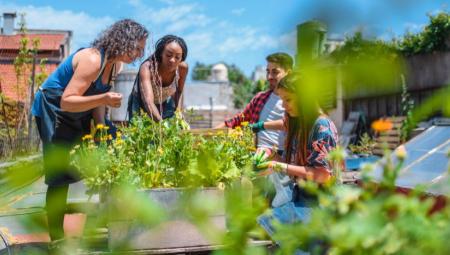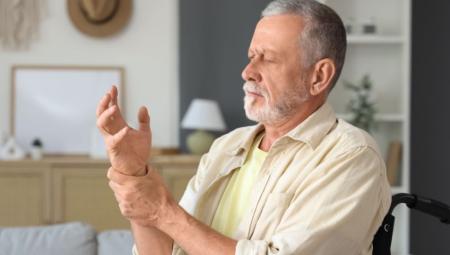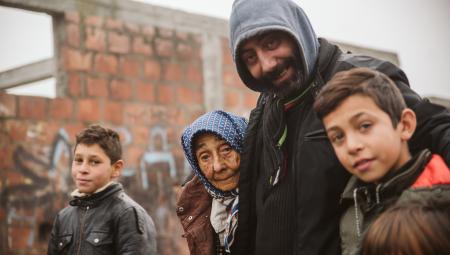Background
Many older people experience exclusion from the communities they live in. The World Health Organisation has recognised this through their Age Friendly Cities and Communities programme, which encourages the development of different spaces and places to improve older peoples' inclusion in their communities and cities. Historically and politically people with intellectual and developmental disabilities (IDD) and people who identify as lesbian, gay, bi, trans + (LGBT+) have been socially excluded from their communities throughout their lives; when people with IDD were housed in institutions and homosexuality was seen as an illness or criminalised. These life experiences put older people from these two groups at greater risk of inequality, discrimination and exclusion in community contexts. Using online technology has also been difficult for older people, particularly for people who already experience exclusion such as those with IDD and those identifying as LGBT+. So far, very little research has been done with these two groups to hear their experiences of local and online community inclusion and exclusion and to better understand how community inclusion can be strengthened in England and Scotland.
Project Aims
Research Questions
- How do mid-older people with IDD and those who identify as LGBT+ attribute meaning to inclusion, exclusion in online and local community participation?
- How do mid-older people with IDD and those who identify as LGBT+ experience societal inequalities, patterns of inclusion and exclusion over the lifespan, and at points of intersection across groups?
- How might spaces and places be made accessible to provide supportive, inclusive communities for mid-older people with IDD and those who identify as LGBT+?
- How might local / online community spaces and places be co-created to facilitate inclusion, minimise exclusion and encourage social and community resilience in mid-older IDD and LGBT+ people as to reduce layers of inequality?
- How might policy and practice shape and improve inclusion and reduce experiences of exclusion for mid-older people with IDD and those who identify as LGBT+ in everyday local and online community life?
The research aims to:
- Develop understandings of how to co-create inclusive physical, social, cultural, and virtual community spaces and places, services, and resources for and with mid-older aged IDD (including those with profound and multiple disabilities wherever possible) and LGBT+ people (aged 45 years and older) to enhance community participation and
- Translate findings into inclusive policy and practice. Although an age band for the current research has been specified, the project will focus on the notion of generation within sampling and analytical frame to, as Pritchard and Whiting (2014) suggest, organise understandings of age-related issues. This is necessary to fully understand the life course perspective and how that translates into community inclusion since the norms of a generation provide strong social locations for the thoughts, attitudes and actions of people born into a particular era. Here, the project will include people of the 'lost generation', 'baby boomers' and 'generation X' whose lives were differently affected by economic hardship, uncertainty, confidence, resourcefulness, technology and education.
Project Activity
The research is organised in five related work packages (WPs). Which are jointly led by university researchers and practitioners in third sector organisations. All stages of the research will be guided by people with lived experience in IDD and LGBT+ in advisory groups. People with IDD and LGBT+ lived experience will work as trained co-researchers on the project. We will use a variety of verbal, visual and geographical methods to access marginalised voices in appropriate ways and enable diverse people's views to emerge. We will:
- Build collaborative, transdisciplinary partnerships to generate and analyse qualitative and quantitative data through the ARCGIS storytelling tool to establish how mid-older people with IDD and those who identify as LGBT+ attribute meaning to inclusion, exclusion in online and local community participation (WP1 and WP2).
- Generate and analyse data through qualitative social network analysis using egocentric sociograms (relational, online and community based) to identify online and local experiences of community inclusion and participation over the lifespan amongst 1) mid-older people with IDD and 2) those who identify as LGBT+, and 3) identify points of intersection across groups. (WP2).
- Conduct interviews and deliberative dialogue workshops with professional and practitioner stakeholders to understand how spaces and places can be made accessible to provide supportive, inclusive communities for mid-older people with IDD and those who identify as LGBT+ (WP2).
- Use data and analyses from WP2 and 3 to generate potential solutions for the development of local / online community spaces and places which facilitate inclusion, minimise exclusion and encourage social and community participation in mid-older IDD and LGBT+, reducing layers of inequality (WP3 and WP4).
- Translate and mobilise knowledge from research findings to provide strategies and recommendations to influence policy and practice to improve inclusion and reduce experiences of exclusion for mid-older people with IDD and those who identify as LGBT+ in everyday local and online community life? (WP4 and WP5).
Anticipated Impact
The project relates to community inclusion. Expected outcomes relate to exploiting the findings to promote opportunity and reduce inequalities of outcome for older IDD and LGBT+ people. Increased awareness of the lived experiences of IDD and LGBT+ groups inform public and policy discourse and empowers previously marginalised groups
Papers and resources
This project can be viewed in a case study format for easy accessibility
Who is involved?
Principal Investigators:
- Professor Judith Sixsmith
- Dr Mei Fang, University of Dundee
Co-applicants:
- Dr Susan Buell (Dundee)
- Professor Mark Smith (Dundee)
- Dr Susan Levy (Dundee)
- Professor Kathryn Almack (University of Hertfordshire)
- Dr Darren Chadwick (University of Liverpool)
- Ms Fiona Dobbie (University of Edinburgh)
- Anne Conner (Outside the Box)
- Grace Cardozo (Sleeping Giants)
- Sarah Offley (Dudley Voices for Choice)
- Anna Marriott (National Development Team for Inclusion)
- Pat Scrutton (Intergenerational National Network)
- Lorne Berkley (SCLD)
- Benjamin Thomas (Opening Doors, London)





